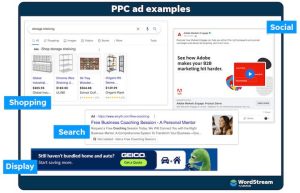
Google Ppc Campaign Management administration of a Google Pay-Per-Click (PPC) campaign can have on organizations seeking to generate conversions, attract targeted traffic, and increase visibility in the constantly evolving realm of online advertising. This comprehensive guide explores the core components of Google PPC campaign management, providing insightful insights and strategies to maximize your advertising budget.
Advertisers place bets on specific keywords, and when users conduct a search using those keywords, their advertisements are displayed on Google’s search results and partner websites. This is the fundamental concept that underpins Google PPC advertising. An advertising model that is both results-driven and cost-effective, in which advertisers are only billed for their ad selection.
Alos Visit:- Migrate Mailchimp To Klaviyo
Essential Elements of Google PPC Campaign Management
1. Investigation and Determination of Keywords
- Conduct an exhaustive investigation of viable and effective keywords through the use of keyword research.
- Strike a balance between specificity and broad, phrase, and exact match keywords so as to attract a wide range of visitors.
2. Efficient Development of Ad Copy
- Develop impactful and concise advertising copy that aligns with the goals of your organization.
- Utilize ad extensions to enhance content by providing additional information and to encourage user participation through interactions.
3. Strategic Bidding Management Implement.
- It is imperative to consistently monitor and adjust proposals so as to maintain their cost-effectiveness and competitiveness.
4. Segmentation of the Target Audience
- Through the utilization of audience targeting options, it is possible to tailor advertisements to specific demographics, interests, or behaviors.
- The process of creating unique ad groups for different audience segments is critical in order to enhance the effectiveness of messaging.
5. Ads’ Quality and Relevance
- Priority should be given to landing page optimization that is relevant to ad content.
- Ensure that the information presented in your advertisements is relevant and beneficial to your audience.
6. Testing and Optimization of Ads
- Through the use of A/B testing on ad variations, it is possible to identify high-performing elements.
- Consistent optimization of ad copy, visuals, and calls-to-action should be guided by performance data.
7. Monitoring and Evaluation of Conversions
- To evaluate the efficacy of your campaigns, integrate conversion metrics into your strategies.
- Perform an examination of conversion data with the purpose of identifying possible domains for improvement and optimization.
8. Budget Management
- The allocation of budget should prioritize campaigns and keywords that exhibit high performance.
The benefits of managing Google PPC campaigns efficiently - Paid-per-click (PPC) advertisements are displayed at the top of search engine results, providing instantaneous visibility to your target audience.

Benefits of Effective Google PPC Campaign Management
- PPC provides cost management flexibility by charging solely for ad clicks, thereby facilitating scrupulous budget control.
- Incorporate advanced targeting functionalities to efficiently captivate unique user behaviors, geographic locations, and demographic groups.
- The implementation of comprehensive analytics and conversion surveillance enables the precise evaluation of investment return (ROI).
- Pay-per-click (PPC) campaigns facilitate real-time adjustments to bidding, ad copy, and targeting, ensuring flexibility in response to market dynamics.
In summary, effective administration of Google PPC campaigns requires the application of a strategic approach, continuous optimization endeavors, and a deep understanding of the target audience. By implementing the essential elements outlined in this manual, businesses can efficiently employ pay-per-click (PPC) advertising to achieve their marketing objectives, enhance the visibility of their brands, and generate substantial conversions.